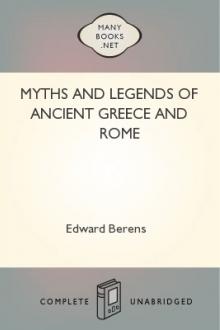Myths and Legends of Ancient Greece and Rome by E. M. Berens (best romantic novels in english txt) 📕

- Author: E. M. Berens
- Performer: -
Book online «Myths and Legends of Ancient Greece and Rome by E. M. Berens (best romantic novels in english txt) 📕». Author E. M. Berens
Obedient to her commands, Celeus called together a meeting of his people, and built the temple on the spot which the goddess had indicated. It was soon completed, and Demeter took up her abode in it, but her heart was still sad for the loss of her daughter, and the whole world felt the influence of her grief and dejection. This was indeed a terrible year for mankind. Demeter no longer smiled on the earth she was wont to bless, and though the husbandman sowed the grain, and the groaning oxen ploughed the fields, no harvest rewarded their labour. All was barren, dreary desolation. The world was threatened with famine, and the gods with the loss of their accustomed honours and sacrifices; it became evident, therefore, to Zeus himself that some measures must be adopted to appease the anger of the goddess. He accordingly despatched Iris and many of the other gods and goddesses to implore Demeter to return to Olympus; but all their prayers were fruitless. The incensed goddess swore that until her daughter was restored to her she would not allow the grain to spring forth from the earth. At length Zeus sent Hermes, his faithful messenger, to the lower world with a petition to Aïdes, urgently entreating him to restore Persephone to the arms of her disconsolate mother. When he arrived in the gloomy realms of Aïdes, Hermes found him seated on a throne with the beautiful Persephone beside him, sorrowfully bewailing her unhappy fate. On learning his errand, Aïdes consented to resign Persephone, who joyfully prepared to follow the messenger of the gods to the abode of life and light. Before taking leave of her husband, he presented to her a few seeds of pomegranate, which in her excitement she thoughtlessly swallowed, and this simple act, as the sequel will show, materially affected her whole future life. The meeting between mother and child was one of unmixed rapture, and for the moment all the past was forgotten. The loving mother's happiness would now have been complete had not Aïdes asserted his rights. These were, that if any immortal had tasted food in his realms they were bound to remain there for ever. Of course the ruler of the lower world had to prove this assertion. This, however, he found no difficulty in doing, as Ascalaphus, the son of Acheron and Orphne, was his witness to the fact.[25] Zeus, pitying the disappointment of Demeter at finding her hopes thus blighted, succeeded in effecting a compromise by inducing his brother Aïdes to allow Persephone to spend six months of the year with the gods above, whilst during the other six she was to be the joyless companion of her grim lord below. Accompanied by her daughter, the beautiful Persephone, Demeter now resumed her long-abandoned dwelling in Olympus; the sympathetic earth responded gaily to her bright smiles, the corn at once sprang forth from the ground in fullest plenty, the trees, which late were sered and bare, now donned their brightest emerald robes, and the flowers, so long imprisoned in the hard, dry soil, filled the whole air with their fragrant perfume. Thus ends this charming story, which was a favourite theme with all the classic authors.
It is very possible that the poets who first created this graceful myth merely intended it as an allegory to illustrate the change of seasons; in the course of time, however, a literal meaning became attached to this and similar poetical fancies, and thus the people of Greece came to regard as an article of religious belief what, in the first instance, was nothing more than a poetic simile.
In the temple erected to Demeter at Eleusis, the famous Eleusinian Mysteries were instituted by the goddess herself. It is exceedingly difficult, as in the case of all secret societies, to discover anything with certainty concerning these sacred rites. The most plausible supposition is that the doctrines taught by the priests to the favoured few whom they initiated, were religious truths which were deemed unfit for the uninstructed mind of the multitude. For instance, it is supposed that the myth of Demeter and Persephone was explained by the teachers of the Mysteries to signify the temporary loss which mother earth sustains every year when the icy breath of winter robs her of her flowers and fruits and grain.
It is believed that in later times a still deeper meaning was conveyed by this beautiful myth, viz., the doctrine of the immortality of the soul. The grain, which, as it were, remains dead for a time in the dark earth, only to rise one day dressed in a newer and lovelier garb, was supposed to symbolize the soul, which, after death, frees itself from corruption, to live again under a better and purer form.
When Demeter instituted the Eleusinian Mysteries, Celeus and his family were the first to be initiated, Celeus himself being appointed high-priest. His son Triptolemus and his daughters, who acted as priestesses, assisted him in the duties of his sacred office. The Mysteries were celebrated by the Athenians every five years, and were, for a long time, their exclusive privilege. They took place by torchlight, and were conducted with the greatest solemnity.
In order to spread abroad the blessings which agriculture confers, Demeter presented Triptolemus with her chariot drawn by winged dragons, and, giving him some grains of corn, desired him to journey through the world, teaching mankind the arts of agriculture and husbandry.
Demeter exercised great severity towards those who incurred her displeasure. We find examples of this in the stories of Stellio and Eresicthon. Stellio was a youth who ridiculed the goddess for the eagerness with which she was eating a bowl of porridge, when weary and faint in the vain search for her daughter. Resolved that he should never again have an opportunity of thus offending, she angrily threw into his face the remainder of the food, and changed him into a spotted lizard.
Eresicthon, son of Triopas, had drawn upon himself the anger of Demeter by cutting down her sacred groves, for which she punished him with a constant and insatiable hunger. He sold all his possessions in order to satisfy his cravings, and was forced at last to devour his own limbs. His daughter Metra, who was devotedly attached to him, possessed the power of transforming herself into a variety of different animals. By this means she contrived to support her father, who sold her again and again each time she assumed a different form, and thus he dragged on a pitiful existence.
CERES.
The Roman Ceres is actually the Greek Demeter under another name, her attributes, worship, festivals, &c., being precisely identical.
The Romans were indebted to Sicily for this divinity, her worship having been introduced by the Greek colonists who settled there.
The Cerealia, or festivals in honour of Ceres, commenced on the 12th of April, and lasted several days.
APHRODITE (Venus).Aphrodite (from aphros, sea-foam, and dite, issued), the daughter of Zeus and a sea-nymph called Dione, was the goddess of Love and Beauty.
Dione, being a sea-nymph, gave birth to her daughter beneath the waves; but the child of the heaven-inhabiting Zeus was forced to ascend from the ocean-depths and mount to the snow-capped summits of Olympus, in order to breathe that ethereal and most refined atmosphere which pertains to the celestial gods.
Aphrodite was the mother of Eros (Cupid), the god of Love, also of Æneas, the great Trojan hero and the head of that Greek colony which settled in Italy, and from which arose the city of Rome. As a mother Aphrodite claims our sympathy for the tenderness she exhibits towards her children. Homer tells us in his Iliad, how, when Æneas was wounded in battle, she came to his assistance, regardless of personal danger, and was herself severely wounded in attempting to save his life.
Aphrodite was tenderly attached to a lovely youth, called Adonis, whose exquisite beauty has become proverbial. He was a motherless babe, and Aphrodite, taking pity on him, placed him in a chest and intrusted him to the care of Persephone, who became





Comments (0)